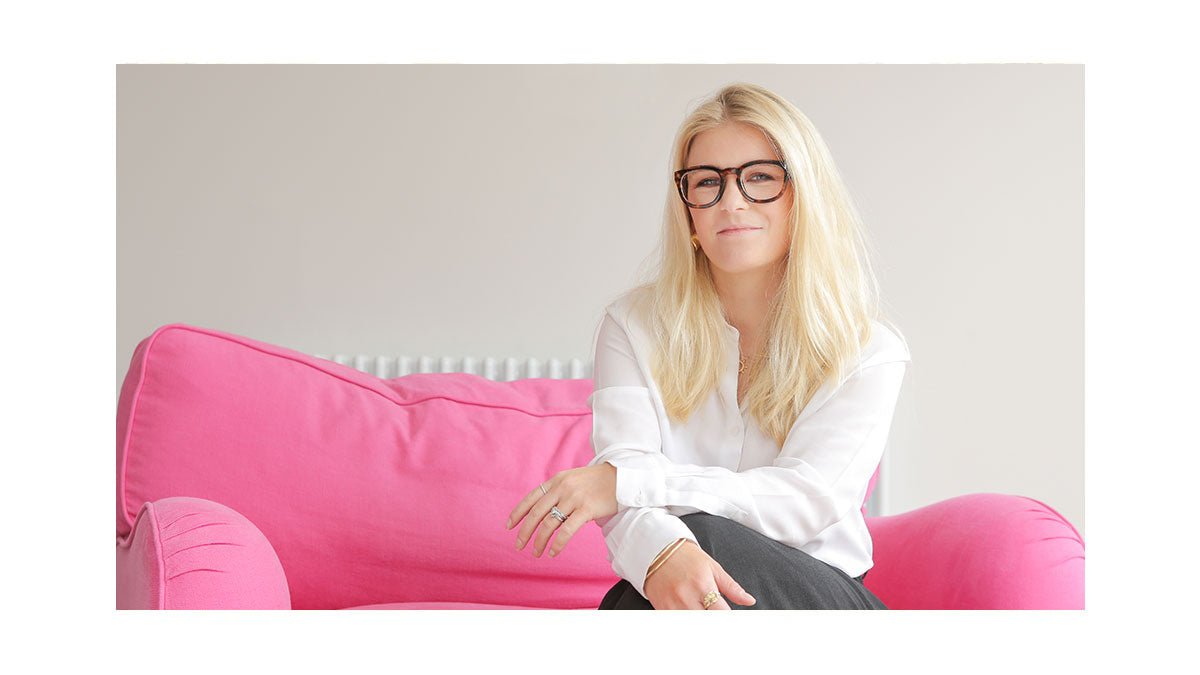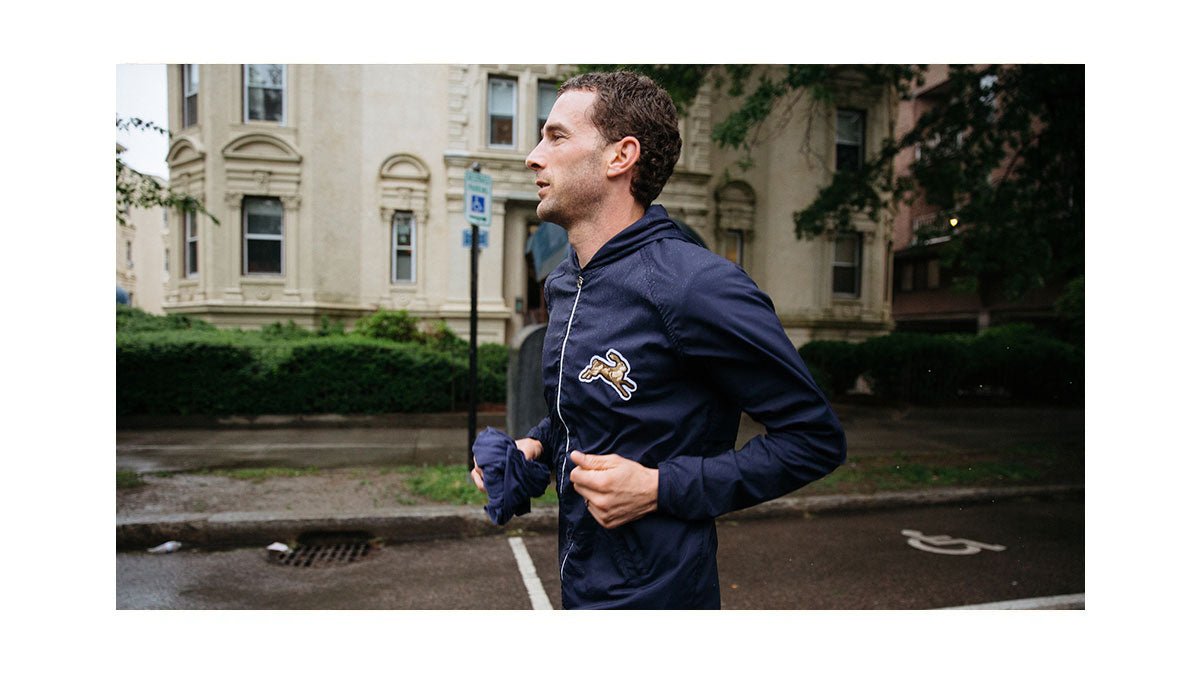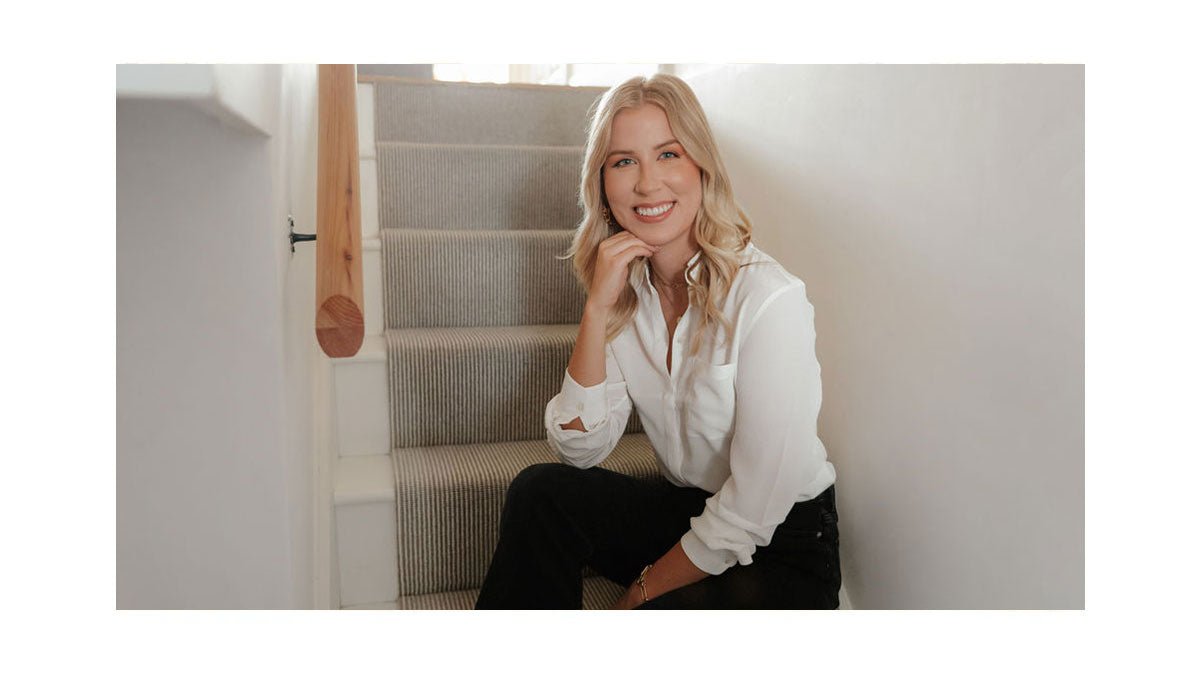
Sunday Edition #28: Kate Moyle
Kate Moyle is a psychosexual therapist and relationship counsellor. She hosts her own podcasts, The Sexual Wellbeing Sessions, and is Lelo's UK sex expert. Today, she shares her take on sexual wellbeing with anatomē, as she stresses the importance of communication, and pleasure.
Tell us your story - how did you find your passion for sexual wellness and women's health?
I've always been interested in psychology and fascinated by what makes people tick, even when I was a teenager and growing up. The minute I had my first psychology class at school, I knew it was for me. I found it especially fascinating that although we all have such different attitudes towards sex and relationships, we don’t really have a place for conversation around sex, so I wanted to explore that further.
What is psychosexual therapy?
Simply put, I’d say that it is turning a key in a lock that nobody knows is there. Often, myself or a client’s partner will be the only people who are aware of certain issues. Changes occur privately, rather than publicly, so it is very much about creating change as a knock on effect within a relationship or family unit, and then out into the world.

How do you define wellbeing?
I think it's quite as simple as how you feel. We know that context is critical to everything in our lives, so wellbeing is different for every person. For me, balance is quite a big part of it. At the end of the day, life is going to throw things at us, so it’s how we deal with it that matters.
Do you have any advice for people as they balance work with healthy relationships?
Take time to take care of yourself and your needs. If you've gone from quite a peaceful time to quite a busy time, then it is important to make space or time to support yourself. It might be that you walk the last ten minutes to work, or that you start your day ten minutes early to have your coffee in peace.
In terms of relationships, communication is critical and one should try to facilitate understanding. It ties into a lot of the work that I do with couples, with the five love languages. For example, if quality time is how we communicate our love to our partners, and that's something that is suddenly threatened or pressed upon because of life being busy, how do we make sure that we communicate that the cause is not a lack of prioritizing or connection, but actually a practicality thing? Or, how do we make sure to incorporate time for that, to fit into the rest of our lives?
How do we ensure that stress doesn't impact our desire or need for intimacy? And why is stress so tightly linked to our sexual wellbeing?
I actually recorded a podcast episode on this topic, called Untangling Stress and Sex with Emily Nagoski.
One of the things that we understand about sex and stress, is that it changes according to the meaning we attach to it. For example, during the pandemic, some people’s desire for sex increased, while others completely plummeted. A lot of this ties into what we use sex for. If you use sex to as a coping mechanism, it’s easier to lean into it when stressed. But, if you associate it with stress and anxiety, you are more likely to pull away from it.
There is also a biological component, where the neuro-chemicals that combat cortisol levels can surge with certain actions, such as touch, hugging, orgasm etc. These can all make us feel calmer.
Can you explain this bidirectional relationship?
Basically, stress can impact sex, and sex can cause stress. When sex is considered a problem for us, we relate to it as something threatening, so instead of it bringing pleasure, connection or excitement, it translates to avoidance, fear and discomfort. This can be incredibly demotivating, so we see a corresponding reduction in desire, or desire response.
Do you have any advise for people who are trying to overcome that sexual avoidance and stress?
Ultimately, we have to go through a process where we relearn sex and recode our understanding thereof, socially and personally. We take steps to build a new, different relationship with sex that isn’t stressfull. Often, this starts with taking the stressor out of the equation, and learning how to connect in other ways. I always encourage my clients to lean into the things they do enjoy and work for them in terms of sensation and touch, and moving from there.
It can be a multi-step process, or step-by-step, depending on the person.

Socially, has there been a shift in our understanding and acceptance of sex?
It has definitely become more approachable, especially recently. I went to the Selfridges Sex and Sleep pop up a few months ago, and I just don’t think that would have happened two years prior.
Yet, our environment works against us as well, in the sense that sex is considered taboo, stigmatized and is still left out of the conversation. We still see huge levels of homophobia, transphobia, and we still have very outdated, ingrained messages. Society is still largely heteronormative, very mono normative. We have a long way to go in terms of accepting the huge variability of sex and sex lives.
How strongly is shame associated with sex?
Unfortunately, it is still the biggest feeling associated with sex. It is embedded into our messaging, and how we think about sex. Our education systems should strive to normalise conversation around sex as subject, rather than something to be spoken around.
Is there a difference in the expression of shame or what shame feelings occur between men and women, or is it quite similar overall?
The feelings are similar, but how it presents itself can be different. A lot of our messaging about sex is very gendered, and informs our ideas about sex ad sexual performance. These ideas can be very limiting for both men, and women, in terms of sexual experience. We need to move away from a focus on performance towards a focus on pleasure. One of my favourite pieces of research is a 2007 paper by D. Buss and C.Meston titled Why Humans Have Sex - they identified 237 reasons!
Are there habits or daily practices that people use to better express their emotions, to feel a bit more confident and assertive to communicate with their partner about how they're feeling and what they need?
- Never start by positioning the issue on our partners. Often we can do so by saying things like, "This isn't working,” or, “you are not good enough, I'm not satisfied," which are naturally met with defensiveness by our partner. Blame creates conflict, so it is always better to start the conversation with a positive, something you feel is working, before you move to what is not.
- Take ownership of how you are feeling, and express it in terms of the first person, i.e. I, me and my. Follow up with suggestions as to what can be done differently i.e., “something I would love for us to do together, or for us to try is…"
- If you’re struggling to open with a positive, share an interview, podcast, news-clip or article on the subject with your partner as a conversation starter.
- It can be useful to shift your conversations about sex or communication about sex outside the bedroom, so that it isn’t as emotional or intense. Rather, flag the conversation as a priority, by inviting your partner to have it with you over dinner, a glass of wine or even a walk outside. Doing this may be helpful, as your partner isn’t immediately confronted with the conversation, and has a bit of time to think about it beforehand.
Communication is really one of the hardest parts of our sex lives. We focus so much on this idea of doing sex, but actually communicating about sex is probably the hardest bit. Sex is one of the only areas of our lives where we're expected, and feel expected, to be an expert on without sufficient teaching, learning, trial and error. I often say that talking about sex is like having a conversation in a language which we've never been taught.
For women, our hormonal cycle plays such an important role in our enjoyment of sex. In terms of listening to our bodies and of honouring our cycles, are there certain times we should be paying more attention to, or certain hormones we need to be more aware of?
No. What we see is that anecdotally, around the time of ovulation, some women, not all women, report feeling more sexually responsive or experience a more spontaneous desire desire for, or interest in, sex.
It’s important that we don’t think of sex as a drive in these cases, but a motivator.
Ovulation and evolution suggest that there's probably a biological imperative to a sexual response around these periods, but that's not the case for all women.
We know that some women have really bad premenstrual syndrome or that taking hormonal contraceptives might dampen their sexual feelings. Everything is context dependent, there's no clear cut science for it.
How severely can different medications affect our sex drive?
We know that anything that changes how our body works, can also impact us sexually. One of the key side effects of selective serotonin reuptake inhibitors is that it impacts sexual arousal. In one of my podcast episodes with Dr. Karen Gourney, she delves deeply into this topic. In the stress episode I mentioned earlier with Emily Nagowski, she talks about her experience with antidepressants and the impact of them on her sex life.
The way that she framed it was that although she had to work harder for her orgasm, the benefits to her overall health, wellbeing and state of mind were so much better, that it balanced out that extra work. In a way, when the doctor said, "This is going to impact your sex life," she took ownership, and understood that she could change things,and create new routines which she could enjoy.
I just did a launch with Headspace and Peanut, and one of the key statistics presented in their research was that only 27% of the women surveyed said they felt comfortable talking to their doctors about sex. Another 89% said that they didn’t think that the medical industry took female sexual desire seriously.
There seems to be a big gap between the society’s sexual needs, and the willingness of medical assistance.
Yes, and this is where more research would be really useful. When we think of the dual control model and our inhibitory and exhibitory system, we often don’t understand to what extent we can influence it or not.
If we are told by a doctor, "This is a medication. If you take it's going to ruin your desire. You're not going to want sex so much." Then you're not giving any solutions to try, to test. The worst thing would be to just accept it, without challenging it. For example, there’s nothing to stop you enjoying touch or other sensations, or even to increase intensity by incorporating a sex toy, a lubricant or engaging in more non-penetrative sex.
It might take you a bit longer to feel like you're ready for sex, but it doesn't have to impact you in such an extreme way as the medical industry often implies. That kind of attitude leaves many people feeling restricted, ashamed or less than, which is even more of a demotivator for desire.
Do you have any common myths you often have to dispel regarding sex?
- People often assume that sex is only defined as intercourse, and that's it. It’s a very limited, restrictive, heteronormative, ableist definition of sex. Intercourse can be a part of sex, but there are so many other ways we can be sexual, sensual and sexually connect. Opening up that definition of sex is helpful for everybody, and leads to greater enjoyment and acceptance.
- There are also lots of gendered myths! Things like, “men initiate sex and women respond,” which is just not true. There are often more dominant personalities, and more submissive personalities in relationships, but it is not necessarily related to gender, nor is it always the case. Often it is balanced.
- Another is that the female orgasm is more complicated or tricky. In reality, this is a social consequence to a lack of education around the clitoris and female sexual pleasure, which is reinforced by the model of sex that's being taught and focused on - intercourse.

You've been chatting about your podcast, which is a phenomenal resource for people, and some studies and books. Do you have any specific recommended reading for people who want to learn more about the topics we’ve discussed today?
- Come As You Are by Emily Nagoski. There's an accompanying workbook, which I think is a really great resource for people that want to actively do something about their sex lives and relationships.
- The Ferly App. It's really brilliant for women, and it's basically a mindful sex app. It has audio guided follow along exercises.
- The new Headspace Women's Collection. It has in-built resources for dealing with things like miscarriage, and there's a section called strength and solidarity, which is about how to deal with difficult emotions around things like Roe versus Wade. It's a response to women's rights as well as women’s health.
- Mind the Gap by Dr. Karen Gurney. This is a brilliant book on female desire. Her TED talk is also an amazing resource!
- Mojo. More for men, the platform specifically supports those struggling with psychological erectile dysfunction.
- Sex Ed for Adults by Ruby Rare. It's an illustrated, fun sex education guide for growing up basically.
At Anatome we really believe in holistic health. Are there any small practices, which make quite big differences to our lives, that people can implement just to get a little bit more joy in the everyday?
Get to know your body, and by that I mean exploring your body, not only as it relates to masturbation.
Get to know your erogenous zones through touch, what areas of your body you like touched or don't like touched, how you like to be touched. Masturbation can be part of that, but doesn’t have to be.
Exploring your body helps you feel more confident, and enables you to communicate to your partner more clearly - "Actually could you move your hand slightly," or, "I don't really like being touched on my chest," or, "Could you slow down a bit?".
Another thing that feels really hard, but that is such a game changer, is listening to podcasts and reading up on things related to sex regularly, so that we open up our perspectives about sex.
Often, we don't think about sex until we have to, which usually means when we’re experiencing a problem or a challenge. Consequently, we've never reconsidered or challenged what we've been taught about sex and why that sexual blueprint or narrative might not be best serving us.
Sex is not static, but it feels like we're taught that it is. There's plenty that you can do about it!
For people who are wanting to explore intimacy and try new things, what do you recommend?
So I'm the UK sex expert for Lelo, and I think if you are interested in trying sex toys or trying something new, then I advise couples to look at a sex toy website together. Talk about what you like the look of, what you don't like the look of, what you're interested in. Doing it together can be quite a fun thing itself, and can build up anticipation. You can create a yes, no, maybe list, and talk it through together. Those kinds of things can be quite playful and fun. If you're able to, you can make them into a game, you can make them quite lighthearted. There's no reason that you can't do that.
What’s on the horizon for you?
I have a book that will hopefully be coming out next year, so I’m really excited about that!I would love to do series four of the podcast, and my therapy practice continues. I'm in the stage of my life where my children are young, so it's also about watching them grow up and being present in their lives.
If you'd like to learn more about Kate, visit her website, or listen to her podcast today at katemoyle.co.uk




